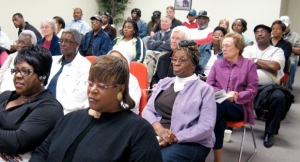Fremont residents get tips on how to save energy
By Anessa Myers
Published in News on April 1, 2009 1:46 PM

News-Argus/ANESSA MYERS
More than 50 residents came out to the energy efficiency workshop at Town Hall Tuesday night to learn how to cut down their electricity bills.
FREMONT -- More than 50 residents came to the Fremont Town Hall Tuesday night to learn how reduce their electricity bills.
ElectriCities representative Brian McGinn said he wanted to give the residents tips on how to conserve energy.
Fremont is one of the towns in the ElectriCities compact that have suffered high electricity bills for years.
McGinn said residents needed to go home and take a good look at their homes and locate where, when and how electricity is being used.
"This is about your house. Ask questions about your house," McGinn told the group.
He said that there are two facets to maintaining energy efficiency -- the house itself and their own habits.
"If there are 100 houses on the same street, you are going to get 100 different electric bill (amounts)," he said. "People use energy differently."
And it's easier to change your habits than it is to change your house, he said.
He offered tips on how to cut electricity use without affecting their comfort or their lifestyles
"Heating and cooling uses the most energy," McGinn said. Water heaters, refrigerators, washers and dryers are also big energy users.
So, McGinn told residents to use their appliances wisely.
"A full freezer is more efficient than one with a few things in it," he said. "Older fridges use more energy. ... Make sure your vent on your dryer is clean."
Residents asked questions several questions about water heaters -- are the tankless ones more efficient and at what temperature should they be set.
"There is no tank with the tankless water heaters so 24 hours a day you are not heating water. You get hot water only when you ask for it," McGinn said. "So with the right application, I think it's great."
As for water heaters with a tank, he said the temperature should be set below 120 degrees to be most efficient.
He suggested residents invest in a digital thermostat for their heating and cooling systems because older ones are less accurate.
In the winter, temperatures inside a home should be set between 68 and 72 degrees for the maximum efficiency, and in the summer, temperatures should be set between 76 and 80 degrees, McGinn said.
Also, if residents keep their home at one temperature, and even cut the thermostat down a few degrees while they are at work, they will be using less energy.
"But don't cut the heat down drastically," he said. "A few degrees is OK when you go to work."
Filters in central heating and cooling systems should be replaced once a month, McGinn said. That allows the system to work less and the system use less energy.
"The best ones to use are the cheapest ones," he said. "I think they are a blue color. Pleated filters don't let enough air through, so your system works harder.
"I always thought, if it costs more money, it's got to be better. That's not the case. It's just the opposite here."
Then he asked the crowd if they ever close vents in rooms that they don't use.
"You want to keep them open," he said.
Keeping the vents opens allows air to circulate back to the system, and closing the vents basically "starves" the system for air, he said.
"And then your system works harder, and it costs more money," he said.
McGinn told residents that they should also keep interior doors open, since it allows for better air circulation.
Other residents asked about foundation vents, computers and window air conditioning units.
"The big thing with foundation vents is that you want the underneath of your house to stay dry," he said. "If you keep them closed, and it's dry, then keep them closed. If you keep them open, and it's dry, then keep them open."
Computers, as with any other electrical device, should be turned off when not in use.
"Like cell phone chargers. Turn them off when you aren't using them because if they are plugged in, they are using energy," he said.
Window air conditioning units are good, he said, if you can seal around the unit, especially in the winter when heated air can leak through to the outside.
In every house, McGinn said, there are places where heated or cooled air is lost -- by the windows and doors and through the chimney and roof.
Chimneys are particularly bad for letting heated or cooled air escape, if you don't have a damper, he said.
"Chimneys are an energy hog," he said.
They lose about 400 cubic feet of heated or cooled air per minute if the damper is open, meaning more zeros on your electricity bill.
As for the rest of the house, McGinn said good insulation can be a major improvement.
"It keeps heated and cooled air in your house longer," he said. "Insulation is one of the best and cheapest ways to lower your bills."
Each resident that came to the workshop received an energy efficiency kit complete with compact fluorescent light bulbs, a filter whistle that helps tell the resident when to change it, a refrigerator temperature card, a hot water temperature card, an air temperature card and foam inserts for behind light switches.
Many residents were more than satisfied for their tips.
"Has this program been worthwhile?" Fremont Town Manager Kerry McDuffie asked.
"Yes," the crowd replied.
McGinn said he also does more thorough energy efficiency assessments by coming out to individual homes and he encouraged residents to sign up for an inspection.
Fremont residents who wish to sign up for a free assessment should call the Town Hall at 242-5151.
